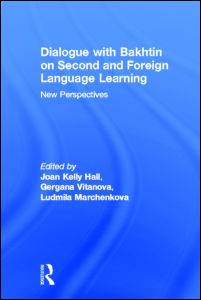Hall, J. K., Vitanova, G., & Marchenkova, L. A. (Eds.). (2004). Dialogue with Bakhtin on Second and Foreign Language Learning. New York: Routledge.
This volume is the first to explore links between the Russian linguist Mikhail Bakhtin's theoretical insights about language and practical concerns with second and foreign language learning and teaching. Situated within a strong conceptual framework and drawing from a rich empirical base, it reflects recent scholarship in applied linguistics that has begun to move away from formalist views of language as universal, autonomous linguistic systems, and toward an understanding of language as dynamic collections of cultural resources. According to Bakhtin, the study of language is concerned with the dialogue existing between linguistic elements and the uses to which they are put in response to the conditions of the moment. Such a view of language has significant implications for current understandings of second- and foreign-language learning.
The contributors draw on some of Bakhtin's more significant concepts, such as dialogue, utterance, heteroglossia, voice, and addressivity to examine real world contexts of language learning. The chapters address a range of contexts including elementary- and university-level English as a second language and foreign language classrooms and adult learning situations outside the formal classroom. The text is arranged in two parts. Part I, "Contexts of Language Learning and Teaching," contains seven chapters that report on investigations into specific contexts of language learning and teaching. The chapters in Part II, "Implications for Theory and Practice," present broader discussions on second and foreign language learning using Bakhtin's ideas as a springboard for thinking.
This is a groundbreaking volume for scholars in applied linguistics, language education, and language studies with an interest in second and foreign language learning; for teacher educators; and for teachers of languages from elementary to university levels. It is highly relevant as a text for graduate-level courses in applied linguistics and second- and foreign-language education.
